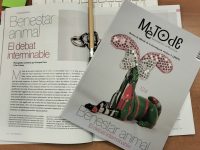|
I vividly remember a conversation about the importance of basic science at Harvard University with chemistry Nobel laureate Walter Gilbert. Dr. Gilbert stressed the importance of doing research in order to understand how nature works without worrying about its applications. He argued that the scientist’s task was to acquire new knowledge, and that history had shown time and again that many practical applications had sprang from research that seemed devoid of any use. Dr. Gilbert argued and argued that research in unexplored fields was a huge source of surprises, but suddenly, he looked at me and said something like «however, make no mistake: basic science does not exist. Ultimately the goal of all research is for it to be applied and be useful to somebody». The Nobel Laureate became serious, and said that «doing basic science» was a personal or institutional decision to terminate the research process following a scientific publication. This «basic» science was breached and it meant leaving the process halfway through. And this is just the criticism I want to raise against many scientists and institutions of the Spanish State: too often I hear great pleas for basic science, regardless of the fact that what we don’t do in this country is applying the results of our research. Spanish scientists are too used to hearing that publishing a good paper is the final requirement to comply with the job. And maybe it is the final requirement for the scientist, but not for his or her institution. The journey of science does not end with publication. It must necessarily proceed with an application of this knowledge. And this applies to all fields of science. Obviously, cosmologists researching the origin of the universe will have a hard time trying to get any patents issued from the result of their work, but even this basic knowledge has an application, which is none other than its diffusion. If these cosmologists make an important discovery, its application is to make humanity wiser. It will be of no use if it is published by an academic journal and stays within this field. Diffusion is a must. Likewise I’m sick of hearing Spanish researchers in the field of biomedical research, for instance, whose only concern is publishing their dismal results, to selfishly add a couple of lines to their CVs without even considering how their research can be applied in a useful way. Looking at the number of scientific publications and patents registered in the Spanish State, we can see that we are quite good in terms of publications if compared to other countries, but pathetic in terms of applications. And this is a serious shortage. Basic science does not need so many vindications. We are already pretty good at it. What we need to reinforce is the transfer of knowledge, despite the fact most scientists do not like to hear it. These are the same scientists who complain about cutbacks without providing enough data regarding the value of their own research. I’m exaggerating, but I think I have made my point. We should in no way idealize the American system and think we should copy every aspect of their model, but only one kilometre separates Walter Gilbert’s office from that of another researcher I find particularly inspiring. Robert Langer has the largest laboratory at MIT. More than a hundred researchers from fifteen different disciplines work for him. I do not know how many thousands of papers he must have signed throughout his career, but he has more than six hundred patents and many of his discoveries have resulted in dozens of companies, some of which can be seen by taking a simple walk around the MIT in Cambridge. Make no mistake: Prince of Asturias Laureate Robert Langer is a champion of basic science. We had a conversation and he said to me, «What I want is to go the full way: starting with basic research, and finishing with practical application and therapy in patients. I can’t settle for putting together only part of the puzzle». Langer knows very well that only a small part of his research will end up giving practical fruits, but he has an attitude of perseverance to this end, which I don’t usually see in Spanish researchers. And I have met many, and very different among them. Here we love blaming governments and bureaucrats (and not without a cause), and I know that our industrial structure and a poor tradition of risk investments does not help at all, but I think the Spanish scientific community has to be self-critical in this regard. It comes from a conservative tradition that is changing, but it should change even more. It is alright to vindicate basic science, because it is entirely necessary, but we have traditionally left applied science unattended. And that is something that we need to change. I remember like it was yesterday how a very close person got home all elated because they had accepted her paper on a mechanism that could stop angiogenesis. I asked «what now?» and she told me she would focus on a new project . «Would you not like to continue with that and see if you can get a pharmaceutical application?» «Well… that’s not my job. I do basic research», she replied. What a disappointing response … Maybe Langer will read her paper and will apply all this knowledge she was giving away. Later on, this researcher complained that she could not return to Spain to do more research, but the truth is that what we need is more Langers not non-entrepreneurial researchers who are naively concerned with basic science, which does not really exist, and is no more than a convention, a first methodological step, a decision to stop the process right at the point where it gets more interesting. |
 Moisés Mahiques Moisés Mahiques
«The journey of science does not end with publication. It must necessarily proceed with an application of this knowledge» «It is alright to vindicate basic science, because it is entirely necessary, but we have traditionally left applied science unattended. And that is something that we need to change» |
Search
© Mètode 2014 - 83. Online only. The Digits of Science - Autumn 2014
Pere Estupinyà
Writer and science communicator, Madrid. He is the host of El cazador de cerebros (La 2).





